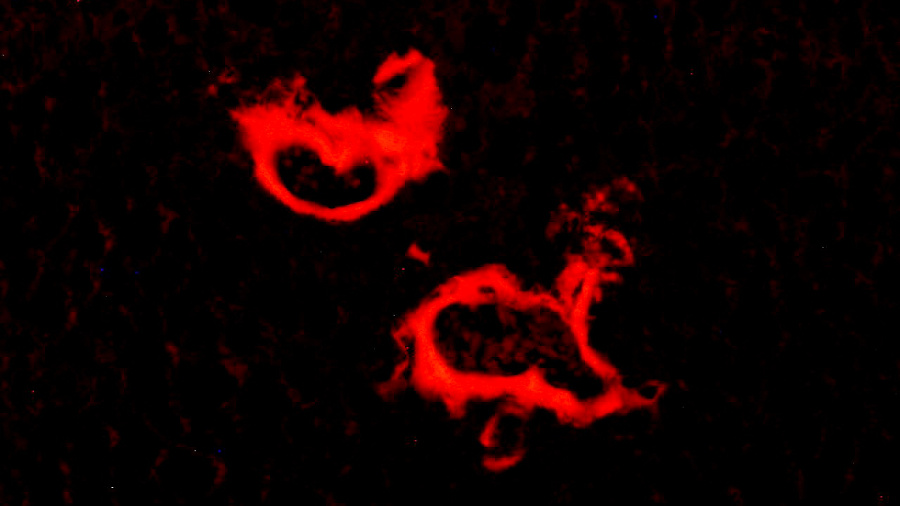Researchers show the importance of the liver-brain axis in Alzheimer's disease
A research team from the Universitat Autònoma de Barcelona (UAB) studied the liver of Alzheimer's disease mice models, and described morphological, cellular, and functional alterations. In addition, they demonstrated the importance of the liver-brain axis regarding the psychological symptoms of the disease.

Traditionally, research in Alzheimer's disease has focused exclusively on the study of the brain alterations that people with this dementia present. However, there is a hypothesis that oxidative stress and inflammation, accentuated by aging, may play an important role in the development of the pathology. In this context, the liver, which is the organ in charge of regulating the metabolism and supporting the immune system, could be a key organ in its development and prognosis.
A research team from the UAB Institut de Neurociències, led by Professor Lydia Giménez-Llort from the UAB Department of Psychiatry and Legal Medicine, in collaboration with Professor Josep Reig-Vilallonga from the UAB Department of Morphological Sciences, studied this hypothesis by comparing Alzheimer's disease mice models and control mice of the same advanced age and sex. The findings revealed several features of liver dysfunction in the diseased mice, including hepatomegaly (enlarged liver), histopathological amyloidosis (abnormal protein deposits in tissues), oxidative stress and cellular inflammation.
Recently, in another study by the group, researchers highlighted the involvement of the peripheral organs in this disease, and their importance in the psychological aspects of the pathology. This new study shows that there are alterations in the liver-brain axis, which are related to behavioral changes, such as increased neophobia (fear of novelty), and dysfunctions in the hypothalamic-pituitary-adrenal axis (HPA), which regulates responses to stress.
''We saw that diseased mice presented larger livers, and when we examined them under the microscope, we realized they had liver pathology in the form of amyloidosis. That is why we decided to deepen the study of the alterations that could be occurring in the liver and in the liver-brain relationship, which has been rarely studied until now'', explains Juan Fraile, researcher at the Institut de Neurociències and first author of the article, with which he starts his PhD.
"The histopathological evaluation of the control mice samples also provided new data regarding the aging process. Hepatic steatosis was the distinguishing feature in the livers of these animals, and in the male sex it was associated with obesity", adds Professor Josep Reig-Vilallonga.
The involvement of the liver in the cleaning of the b-amyloid protein, which accumulates in the brain of Alzheimer's patients, is well-known, as well as the possible inflammatory communication through pro-inflammatory factors between these two organs. This is especially important in advanced ages, when the blood-brain barrier becomes more permeable and allows the periphery and the brain to be in closer contact. It is then that the liver, due to its detoxification function, becomes saturated and increases its inflammation and oxidative stress, which worsens neuroinflammation and oxidative stress in the nervous system. In addition, apart from age, the research team demonstrates the influence of sex (male) and isolation (especially when it is unwanted) on the progression of hepatomegaly, oxidative stress and inflammation, with the consequent worsening of the prognosis of the disease.
"The liver-brain axis alterations and liver dysfunction observed in the diseased animals in our study open new paths to understanding the systemic aspects of this complex disease, and facilitate the identification of potential targets for further research, including the perspective of sex/gender and the impact of loneliness", explains Dr. Giménez-Llort.
The authors conclude that hepatic oxy-inflammation and neophobia represent potential targets of systems integration in Alzheimer's disease research, targets that include intrinsic factors, such as genotype and sex, and extrinsic factors, such as social conditions. The study marks a significant advance in the understanding of Alzheimer's disease and underlines the need to expand the scope of research beyond the brain, considering the influence of peripheral organs and systemic factors.
Research article:
Fraile-Ramos J, Garrit A, Reig-Vilallonga J, Giménez-Llort L. Hepatic Oxi-Inflammation and Neophobia as Potential Liver-Brain Axis Targets for Alzheimer's Disease and Aging, with Strong Sensitivity to Sex, Isolation, and Obesity. Cells 2023 May 30;12(11):1517. doi: 10.3390/cells12111517.
The UAB, with Sustainable Development Goals
Good health and well-being